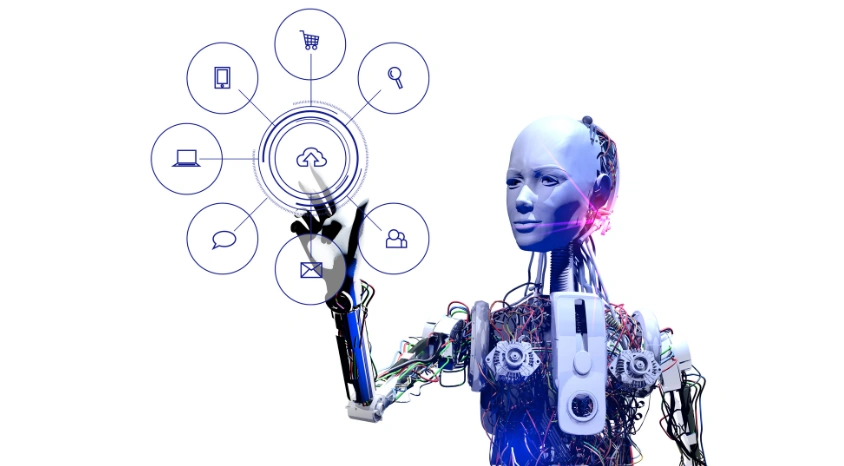The e-commerce industry in South Africa has experienced significant growth due to increased internet usage, an expanding middle class, and a shift in consumer behavior towards online shopping. The COVID-19 pandemic has further accelerated this trend, as businesses and consumers have increasingly adopted digital channels to sustain operations and access goods and services. However, the impact of AI on e-commerce also faces new challenges, including tough competition, logistical obstacles, and the changing needs of tech-savvy consumers. To remain competitive South African e-commerce businesses are turning to artificial intelligence (AI) to gain an edge. This blog explores how AI reshapes the South African e-commerce industry, highlighting its potential to transform the sector and drive sustainable growth.
The Current State of E-commerce in South Africa

The South African e-commerce market has experienced exponential growth over the past decade. According to recent statistics, online sales in South Africa are projected to reach over ZAR 225 billion by 2025, representing a substantial increase from previous years. This surge in e-commerce activity can be attributed to several factors, including improved internet access, the proliferation of smartphones, and a growing preference for online shopping among consumers. However, despite this growth, the sector still faces significant challenges.
One of the main obstacles for e-commerce businesses in South Africa is the high cost of logistics and delivery. The country’s vast geographical landscape infrastructure challenges make it difficult to ensure timely and cost-effective delivery of goods, particularly in rural areas. Furthermore, the highly competitive market demands that businesses continuously innovate and provide exceptional customer experiences to differentiate themselves from competitors. This is where the need for technological advancements becomes apparent. To remain competitive and meet the evolving demands of consumers, e-commerce businesses in South Africa must adopt advanced technologies, with the impact of AI on e-commerce at the forefront.
Understanding The Impact of AI on E-Commerce

Artificial intelligence (AI) refers to the simulation of human intelligence processes by machines, particularly computer systems. In the context of e-commerce, AI encompasses a wide range of applications designed to improve various aspects of the online shopping experience. These applications include machine learning, natural language processing, and computer vision, among others. The Impact of AI on E-Commerce offers numerous benefits, from enhancing customer service to optimising marketing strategies.
In South Africa, AI is transforming the e-commerce sector by providing businesses with the tools they need to better understand and cater to their customers. AI-powered algorithms analyse vast amounts of data to reveal insights into consumer behavior, preferences, and trends. This enables e-commerce businesses to deliver personalised shopping experiences, streamline operations, and ultimately increase sales. Delving deeper into how AI is revolutionising e-commerce in South Africa, it becomes clear that this technology is not just a luxury but a necessity for businesses looking to thrive in the digital age.
How AI is Revolutionising E-commerce in South Africa

Personalised Recommendations and Product Suggestions
One of the most significant ways the impact of AI on e-commerce works in South Africa is through personalised recommendations and product suggestions. By analysing customer data, AI algorithms can predict what products a shopper is likely to be interested in based on their previous purchases, browsing history, and other online behavior. This level of personalisation not only enhances the shopping experience but also increases the likelihood of conversion, as customers are more likely to purchase products that are relevant to their needs and preferences.
Chatbots and Virtual Assistants for Customer Service
AI-powered chatbots and virtual assistants have become increasingly popular in the South African e-commerce sector. These tools provide instant customer support, answering queries, resolving issues, and guiding customers through the purchasing process. Unlike traditional customer service, which may involve long wait times, AI chatbots are available 24/7, ensuring that customers receive prompt assistance whenever they need it. This approach not only enhances customer satisfaction but also allows human resources to concentrate on more complex tasks.
AI-Powered Marketing and Advertising Strategies
Marketing and advertising are crucial components of any successful e-commerce strategy. AI is playing a pivotal role in optimising these efforts by enabling businesses to target their campaigns more effectively. Through machine learning algorithms, AI can analyse customer data to identify patterns and predict which marketing messages are likely to resonate with different segments of the audience. This allows businesses to create highly targeted campaigns that deliver personalised content to the right customers at the right time, thereby increasing the return on investment (ROI) for marketing efforts.
Streamlining Supply Chain Management and Logistics
AI is also making significant strides in streamlining supply chain management and logistics, which are critical areas for e-commerce businesses in South Africa. AI-powered tools can optimize inventory management by predicting demand for specific products, allowing businesses to stock the right amount of inventory at the right time. Additionally, AI can enhance logistics by optimising delivery routes, reducing shipping times, and minimising costs. These improvements not only make business operations more efficient but also significantly improve the overall experience for customers, leading to greater satisfaction.
Enhancing Customer Experience Through AI

Improved Customer Service and Support
As mentioned earlier, AI-powered chatbots and virtual assistants are revolutionising customer service in the e-commerce sector. AI-powered tools like chatbots and virtual assistants can handle a range of customer inquiries, from answering common questions to offering personalised product recommendations based on individual shopping habits and preferences. This allows them to provide both general support and tailored shopping experiences. By leveraging the impact of AI on e-commerce for customer service, businesses in South Africa can offer faster, more efficient support, leading to higher customer satisfaction and loyalty.
Efficient Order Processing and Delivery
AI is also enhancing the efficiency of order processing and delivery. By automating, AI can streamline the order fulfilment process, reducing the time it takes to process and ship orders. This is particularly important in the South African context, where logistical challenges can often lead to delays. By leveraging AI to optimize these processes, e-commerce businesses can ensure that customers receive their orders promptly, leading to a better overall shopping experience.
Tailored Shopping Experiences Based on Customer Preferences
Personalisation is crucial to providing an exceptional customer experience, and AI is making it easier than ever for e-commerce businesses to tailor their offerings to individual customers. By analysing data on customer behavior, preferences, and purchase history, AI can deliver personalised product recommendations, special offers, and content that resonates with each shopper. This level of personalisation not only enhances the customer experience but also drives higher engagement and sales.
Reduction in Cart Abandonment Rates
Cart abandonment is a common challenge in the e-commerce industry, with many customers leaving items in their online shopping carts without completing the purchase. AI is helping to address this issue by providing personalised reminders and incentives to encourage customers to finalise their purchases. For example, AI can send automated emails or push notifications to remind customers of the items in their cart and offer discounts or promotions to incentivise them to complete the transaction. This strategy has proven to significantly lower cart abandonment rates and boost conversion rates.
Driving Online Sales Growth with AI

Increasing Conversion Rates through AI-Powered Insights
One of the most powerful applications of AI in e-commerce is its ability to analyse data and generate insights that can be used to increase conversion rates. By understanding customer behavior, preferences, and purchasing patterns, AI can help businesses identify opportunities to optimize their sales funnel and improve the customer journey. For example, AI can analyse website traffic to identify drop-off points and recommend changes to improve the user experience, leading to higher conversion rates.
Targeted Marketing Campaigns and Promotions
AI is also enabling e-commerce businesses in South Africa to run more effective marketing campaigns. By analysing customer data, AI can segment the audience and deliver targeted marketing messages that are more likely to resonate with each segment. This level of precision allows businesses to create highly personalised campaigns that drive engagement and sales. Additionally, AI can optimize the timing and frequency of marketing messages, ensuring that customers receive promotions at the right time to maximise the likelihood of conversion.
Predictive Analytics for Inventory Management and Pricing Strategies
Effective inventory management is crucial for e-commerce businesses, as it directly impacts the ability to meet customer demand and avoid stockouts. The Impact of AI on E-Commerce provides predictive analytics that can help them forecast demand for specific products, allowing them to optimise their inventory levels and reduce the risk of overstocking or under-stocking. Additionally, AI can assist with pricing strategies by analysing market trends, competitor pricing, and customer behavior to recommend optimal pricing for products. This data-driven approach to pricing can help businesses maximise their margins while remaining competitive in the market.
Future Outlook and Challenges

The future of e-commerce in South Africa appears promising, with AI set to play an increasingly important role in the industry. As AI technology continues to progress, we can anticipate more innovative applications that will enhance the customer experience, streamline operations, and drive sales growth. However, the rise of AI also brings new challenges, particularly regarding regulatory concerns and ethical implications. For example, there are growing concerns about data privacy and the potential for AI to perpetuate biases in decision-making processes.
To navigate these challenges, e-commerce businesses in South Africa will need to adopt a responsible approach to AI integration, ensuring that they comply with relevant regulations and prioritise ethical considerations. By doing so, they can harness the full potential of AI while mitigating risks and building trust with their customers.
In A Nutshell
AI is revolutionising the e-commerce landscape in South Africa by providing businesses with tools to remain competitive. It is impacting personalised recommendations, marketing strategies, supply chain management, and customer service. E-commerce businesses in South Africa need to embrace AI to drive sustainable growth and thrive in the digital age. Now is the time for them to invest in AI technologies and adopt a forward-thinking approach to e-commerce. Read more on how AI in retail can help enhance the customer experience and secure a competitive edge in an increasingly crowded marketplace. The Impact of AI on E-Commerce is undeniable on the South African e-commerce industry and this is just the beginning.



